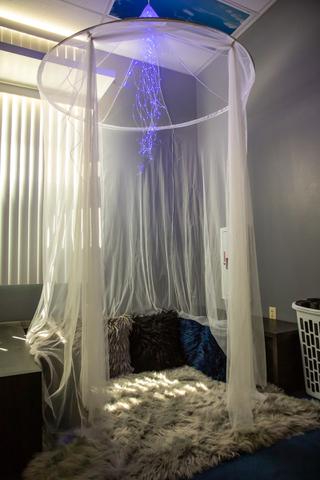Related stories
- Students find calm in North Las Vegas school’s ‘Zen Den’
- Teachers take the spotlight as CCSD students return to classrooms
- 11 more Clark County high schools get security upgrades
- Superintendent: Las Vegas schools ready to meet challenges
- CCSD short by more than 1,300 teachers as students return to class Monday
The halls were empty Monday as the first day of classes was in full swing at Ruby Duncan Elementary School in North Las Vegas.
But if you listened closely, the faint sound of meditation music emanating down the school’s main hallway could be traced to a small classroom near the main entrance.
Inside that classroom — filled with beanbags, trampolines and a number of toys, pillows and other tactile trinkets — Principal Amy Manning was wrapped snugly in a cocoon from made weighted blanket material. And just a few feet away was Clark County School District Superintendent Jesus Jara, peacefully swinging from a green nylon hammock.
Albeit comfy, the two were demonstrating amenities in the school’s “Zen Den,” a sensory and reset room aimed at eliminating aggressive behavior and angst in students so they can better focus in the classroom. It also helps students learn to handle their emotions, which can help mitigate violent outbursts as the kids get older and bigger, Manning said.
“Everyone is entitled to a bad day,” Manning said. “We try to meet our students where they’re at, so we’re making them the most successful person that they can be.”
First launched by Manning before the COVID-19 pandemic, Duncan’s reset room has been a smashing success — resulting in fewer classroom disruptions and about a 20% decline in suspensions and expulsions, she told the Sun in April. And because of that, Jara said, CCSD, the nation’s fifth-largest school district, is looking to roll out similar Zen Dens for each K-12 campus.
“A team came out here last year to see this thing that Amy, as a leader, is innovatively thinking about,” Jara said. “So one of our goals is that we’re now going to really work with our principals in our elementary schools, and middle schools and high schools to create a space to provide this support for students.”
Jara pointed to similar spaces being built in corporate spaces. Between the constant stresses of everyday life and school, having a place for everyone to decompress — teachers included — is beneficial for everyone, he opined.
“We all need a little extra support. Adults and kids,” he said. “Because every single community and every ZIP code needs and should have something where they can be able to reset.”
Reset rooms can also be found across the country — in and around Indianapolis, Fayetteville, N.C., and Dallas, for example. The Dallas Independent School District limited suspensions this year to only serious offenses. For minor violations, older kids can go to reset rooms on every middle and high school campus.
The emotional issues and personal traumas in students were present long before the pandemic, Manning said. The idea started as a single room with a punching bag, but as the pandemic lingered the staff at Duncan was able to plan and outfit the room into what it is today, which even includes a full-time behavior strategist present in the room to talk with anyone who might need it.
“Sometimes kids don’t want to talk, and it’s hard to give that emotion or that expression,” Manning said. “And once they do that, then we can reward them with a really fun area, and then they’re more willing to be open to talk to us about what’s going on.”
But make no mistake — although the Zen Den is treated many times as a reward, it’s not interchangeable with recess. At most, Manning said, a student might spend between 20 and 30 minutes in the Zen Den so that it doesn’t hamper time intended for classwork.
“For the most part, what it’s really focusing on is really shifting that negative behavior to positive behavior, and reporting that because the behavior we pay attention to is the behavior we’re going to get the most,” Manning said.
That can be especially pivotal as the kids get older, and, if left unfettered, temper tantrums and other negative behaviors can develop into more violent outbursts. So if educators can teach more healthy coping mechanisms at a younger age, the thought is that will have a lasting impact.
“If we don’t address it in elementary school, then it goes to middle school, and it goes to high schools, then we put them out in the street,” Jara said. “This is one step as a school district that we are providing our kids the resources and the ability to work with their parents and our staff to change the behavior.”
[email protected] /
(702) 990-2681 / Casey_Harrison1


